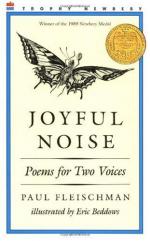
|
| Name: _________________________ | Period: ___________________ |
This test consists of 5 multiple choice questions, 5 short answer questions, and 10 short essay questions.
Multiple Choice Questions
1. What are three words used to describe the whirligig beetle's movements?
(a) Zigzag, lightning, jagged.
(b) Slow, languid, lazy.
(c) Straight as a pencil, a line, sharp.
(d) Merry-go-rounds, swerving, wheeling.
2. The poet creates what between the two readers in "Cicadas?"
(a) A dance.
(b) An echo.
(c) A discussion.
(d) An argument.
3. The poet names _________________ insect species.
(a) Very similar.
(b) Many different.
(c) No.
(d) Very few.
4. "Requiem" is, unlike many of the other poems in this book. How?
(a) It is very humorous.
(b) It is very solemn and serious.
(c) It is very confident.
(d) It is very angry.
5. How are people like the digger wasp?
(a) People also make sacrifices for each other.
(b) People have wings.
(c) People never live to see their offspring.
(d) People are insects.
Short Answer Questions
1. When read aloud by the two speakers, this poem creates a sense of what?
2. How can the lives of the two different bees in this poem be described?
3. What happens when the water boatmen reach their destination?
4. Can many people relate to the queen bee? Why or why not?
5. "Honeybees" is told from the perspective of whom?
Short Essay Questions
1. How are cicadas like a choir?
2. To what else could the water boatmen be compared? Why?
3. Compare the different types of honeybees.
4. How does the author use poetry and literary devices to teach about whirligig beetles?
5. How does the poet use poetry to give the reader a sense of what cicadas sound like?
6. What is the mood of "Cicadas?" Why?
7. Why might the digger wasp die before its young are born?
8. How does this poem draw attention to nature and the life cycle of insects?
9. How can the world of the honeybee be compared to your own world?
10. What is the mood of "The Digger Wasp?" Why?
|
This section contains 765 words (approx. 3 pages at 300 words per page) |

|




